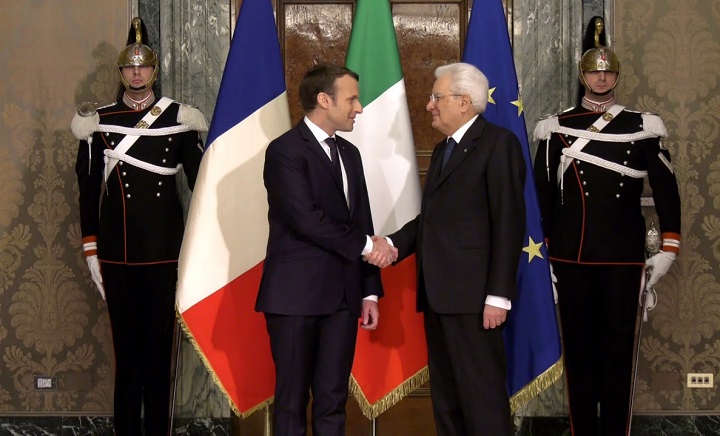
Will the Quirinal pact, to be signed on Friday in Rome between France and Italy, be an empty promise, once again, or will Frantalia be born? We do not know the contents of the agreement, but the political signal is very strong.
The pact, in fact, would be a real strategic revolution within the EU if the agreement is true and substantial. The 1963 Elysée pact between France and Germany, which the Quirinal pact seems to be inspired by, was very different. It came at an important moment of European reconciliation between two countries that had fought each other for centuries and in the middle of the Cold War. France and Germany were becoming the economic and political engine of Europe as it confronted the USSR, all blessed by the US.
Today the Quirinal pact comes at a time of great political weakness in Italy and great uncertainty in Europe. Moscow pressures Ukraine over Donbas seeks Russian integration with Belarus and attempts to isolate Poland, pitting it against Germany and the rest of Europe. The UK has exited the EU and thus is out of its political debate. China is a 360-degree challenge and objectively places European countries in major dilemmas as well. Russia, a well-rounded strategist, sees the American focus on Asia and distraction from Europe as an opportunity and is pushing for space on the old continent.
Then there is the great terrain of Africa, where greater coordination between France and Italy can contribute to the security of the southern front and NATO.
But precisely because this agreement impacts so many important dynamics, at a time of uncertainty, if it begins to be implemented, it will create challenges for the rest of the EU.
Will there be a similar agreement between Germany and Austria, Spain and Portugal, or Poland and Ukraine? In fact, if Catalonia’s independence drive creates moves of emulation across the continent, the same could happen with a deep rapprochement between France and Italy.
This is positive for Italy and puts Rome at the center of European political dynamics, as long as it knows it, has calculated for it and is prepared. It’s like driving a train at 300 mph: Is that necessary? Absolutely for faster and better connections, but it derails if the tracks and carriages are not equipped.
This agreement needs some real legs on it, and the mere industrial collaboration, allegedly dominant in the present agreement, is bound to be controversial. One proposal could be to create a “Napoleon railway,” a transport system linking the peninsula to Elba, Corsica, and Sardinia. This would give real substance to the pact and put an end to the isolation of Corsica and Sardinia for the first time. It would link the islands to Italy and Italy to France.
The same should be done with the bridge over the Strait of Messina, perhaps entrusted to French companies to hammer the agreement and then set up a system of fast ferries between Sicily and Tunisia. That system would project Europe into Africa and not limit Europeans to acting as gruff guardians against emigration.
It is also important to think about having trans-European, and transatlantic companies, so French, American, or German acquisitions in Italy are positive because they give substance to this union. Certainly, the same should happen for Italian companies abroad, which must not have any obstacles.
The project is Napoleonic, not only for its ambition but also for the echoes of history. Napoleon became a great general at the age of 20, when against all odds, he defeated the Austrians in Italy. He invented the Cisalpine Republic and the Italian tricolor, with green instead of French blue, to emphasize brotherhood.
That was the moment of Europe’s expansion throughout the world and the projection of a model of the liberal state that would lead to modernity, a development unprecedented in human history.
Today, on the contrary, we are witnessing the crisis of that liberal state, which allowed the success of Europe in the world. This is not just because of the emergence of more authoritarian leaders worldwide; it is more structural. The state apparatuses have swelled out of inertia because of the growing demand for new services such as social welfare. People believe that old services, once private, are better performed by the state (education or health, but also police or defense). The state is less about setting rules that independent economic-political players will use fairly, and more about managing limited resources and central mediation between conflicting social forces.
Also, back then, there was a European hunger for conquest and territorial expansion. Today, fortunately, this has disappeared, but there are failed states that represent a growing danger and for which there is no solution. Europe thinks, rightly, that dictators are bad, colonization is evil, and democracy is impossible to export. But neither can Europe remain inactive because failed states, in Africa, for example, export destabilization in the form of terrorism, organized crime, and illegal immigrants.
So, what can be done are strong, 360-degree projects, such as creating an infrastructure network between Europe and Africa. The roman empire was vaguely outlined by its shifting borders, limes, but was clearly marked by its crawling network of aqueducts and roads, all leading to Rome.
France and Italy could be very important here—as long as things are actually realized. The rest of Europe and the United States must also be involved in this. Very big shoulders are needed for all of this, and there are important consequences in which all should partake.
There is no doubt that at the moment, domestically, France can handle all this, but what about Italy? What impact will it have on the unprecedented national crisis? Existing parties are uncertain about almost anything, and massive weaknesses in the bureaucracy make actual investments in the new Recovery Plan difficult to realize so far.
Then, in this situation, France could, in some ways, “take over,” lead Italy, perhaps to the benefit of the Italians and the rest of the EU. Or France could be infected in the following years by the political crisis of the Italian parties, the malaise of its bureaucracy, and make France itself difficult to rule. The past example of the European Union possibly is to be considered. Then Italy joined the euro agreement thinking that an external, European golden cage would force Rome to improve its ways and thus push it to become more European.
The opposite occurred. Rome became more irresponsible, and its domestic debt ballooned. The Union felt blackmailed by possible Italian default, and Italy felt constrained by the European rules straitjacketing its politics, economy, and society. The benefits for Italy in joining the eurozone have been massive, as inflation has disappeared for over two decades.
But the EU didn’t move politically forward after establishing the united currency, and, also for this, populistic demagoguery has sprung up all over the continent, often sullying the internal political atmosphere. Then, besides the present agreement, it is essential to figure a clear way forward; otherwise, it all becomes stagnant and poisonous for all those involved.






According to Google there is four days later no news about the Quirinal pact. Is it what is called by the Dutch a ‘dead sparrow´?
Whatever it is or is to become it is wrong to seek protection for it from the failing state US.
US pushed for space in Europe after 1991. It organized two coups in Kiev in 2005 and 2014. The second time Russia was prepared and supported a refeendum in Crimea in whch the majority of the franchise supported accession to the Russian Fedreration. That referendum was of course illegal because not allowed by US.
“The project is Napoleonic, not only for its ambition but also for the echoes of history.”
“That was the moment of Europe’s expansion throughout the world and the projection of a model of the liberal state that would lead to modernity, a development unprecedented in human history.”
It was not. Europe’s expansion to Asia and America began three centuries earlier, long before the “liberal” state appeared. The Portugese won control of the very rich sea borne trade in the Indian Ocean by using armed ships and was replaced by the Dutch and the English a century and more later by the same means.
And there was nothing ¨liberal” about the colonial rule and its use of unfree labor nor about the wars between the European powers about control over their colonies.
Nowadays US use “liberal(?)” methods to maintail its control over a large part of the world, and failing to succeed. See Afhanistan, Iraq, Syria, Libya, &c. So now Europe should help US to succeed in its endeavours and so maintain its own subjection to US.
China is using its armed forces to deter US agggression and to protect freedom of navigation of the world’s merchant ships and to winkle US out of its satellite Taiwan and possibly South Korea. But it is trying to defeat western economic influence by large scale investment in infrastructure, superior education of people and new technology, see Huawai as a significant example.
Does anyone think western compagnies which spend more on buyng in their own shares than on R&D will be effectively defended by cooperation between European countries and US.
A “confederation between Portugal and Spain” seriously? Well I would prefer a confederation between Portugal and Germany. At least they are both Republics and, frankly, there’s more to read, with advantage, in German. Diluting a symbolic sovereignty on a multinational regionality, nowadays makes sense … Trading 8 centuries of individuality (against all odds) for a kleine Anschluss doesn’t seem adequate (and some portuguese had already tried that in the 16th).
Curiously enough, in Portuguese popular language the word to denote “greed” slipped from “avidez” to “ganancia” (“ganância”). It’s a sin 🙂
Europe must forget the old – and impossible – dream of building an United States of Europe, and switch to a Confederation of Sovereign European States which would control areas such as the economy, currency, defense, foreign affairs, environment and health, leaving everything else in the hands of the member -states, although with a high degree of cooperation. Such a Confederation would be acceptable to most Europeans, while the US of Europe are not.
But before aiming for an European Confederation, it might be good to start with some regional Confederations, such as between France and Italy, Portugal and Spain, and the Scandinavian countries, which could later merge into an European wide Confederation.